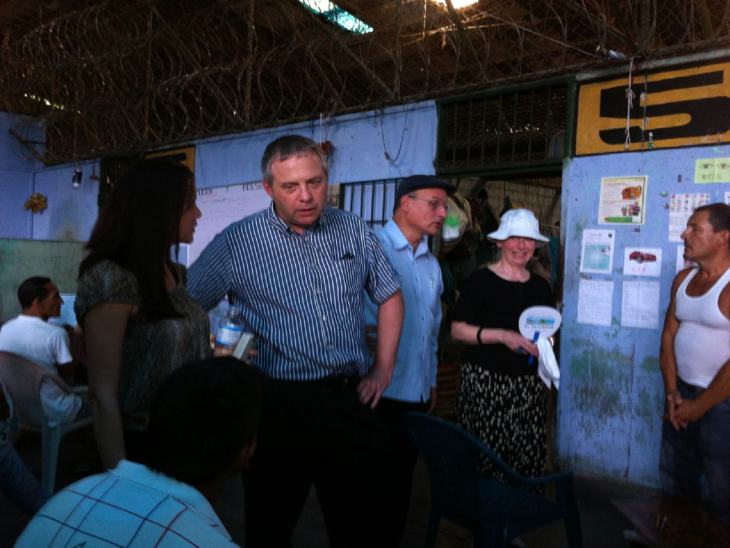

BGIPU gets an insight into the fast changing geopolitics of Central America
There are few more interesting places to visit in Central and Latin America than Costa Rica and El Salvador, the venues for an IPU Parliamentary outbound visit from 10th to 17th February, the first for a number of years.
Both have similar constitutional arrangements, a directly elected President, term limited Legislative Assemblies and complex constitutions, as well as interventionist supreme court legal structures. Both have similar political challenges, being as they are, at the sharp end of narcotics crime, at the crossroads of drug production and distribution (Mexico and South America) and consumption (the United States). Each country’s Presidents are in their last year of office and in both countries, the political campaigning for their successors has begun in earnest!
In addition, they also have similar geopolitical concerns: The need to improve income disparities and social inequality, a greater focus on all forms of education, exploiting new global trading relationships (particularly a recent trade treaty with the European Union), diversifying away from an agricultural-focused economy, raising their profiles as sustainable tourist locations, funding for much needed infrastructure and above all, bringing peace and stability to their citizens. In the short term, meaningful tax reform is needed in both countries, in order to achieve long term policy goals.
They have small populations (about 4.5 million in Costa Rica and in El Salvador over 6 million) but are nevertheless influential regional players. They’ve experienced solid, if unspectacular, economic growth in the last few years and in the case of both countries, but especially El Salvador, their prosperity is closely linked to the strength (or otherwise) of the US economy, their biggest commercial partners.
Much of the trade and other coordinating work is done through SICA (Sistema de la Integración Centroamericana, Central American Integration System), a kind of Central American EU, the headquarters of which is in El Salvador and whose General Secretary the delegation met during our visit.
Costa Rica is a well established, largely peaceful and stable democracy, having endured a brief civil war over 60 years ago and is especially committed to pursue strong policies to reduce climate change and (quirkily) is one of the few countries in the world which has no standing armed forces. The delegation attended the Legislative Assembly and met a slew of Ministers as well as a Chief Justice at the Constitutional Court before heading north east to Earth University not far from the Caribbean coast, a unique private institution in Central America (funded by Kellogg’s of cornflakes fame), developing expertise in the knowledge transfer of sustainable agriculture and horticulture theory and practice across the globe. We were particularly grateful for the advice and support of the Costa Rican ambassador to the UK, Pilar Saborío de Rocafort but also the British ambassadors to Costa Rica, Sharon Campbell and her husband Chris (who job shares but also doubles up as HM Ambassador to Nicaragua).
We left Costa Rica with the impression that the Government’s focus since the Canning House speech by William Hague in 2010 on reaching out to Latin America in order to grow trade and influence through “soft power”, was potentially fruitful and had great potential for UK businesses, in areas like information technology, professional services and manufacturing.
El Salvador has many more serious challenges. Whilst now politically stable, it nevertheless struggles 20 years on, from the legacy of a brutal and vicious 13 year civil war marked by dreadful human rights abuses and death squads. Even today, armed gang culture overshadows civil society unlike almost any other nation in the world. It is still a deeply divided country, not least in wealth distribution, education and health outcomes and political discourse. Nevertheless, it has the buzz of a country beginning to move on from a grim past and seizing new opportunities. This is perhaps why our Government decided to re-open the British Embassy last year, it having been closed in 2003.
We had a very wide range of fascinating visits organised and superb support from our Ambassador Linda Cross and the El Salvadoran Ambassador to the Court of St James, Werner Romero, in order to get a flavour of the country. Visits to the Legislative Assembly and various Ministries, to San Salvador Cathedral at the tomb of civil war martyr Archbishop Oscar Romero, to the El Boqueron volcano, the unique Ciadad Mujer (Women’s City) health project and to the Apanteos Prison, both in Santa Ana, stand out.
For me, the football match at the “combating gang violence through sport” event in the desperately poor township of Mejicanos north of San Salvador, was our most memorable occasion – we were struck by the warm hospitality of local people, the sense of hope from the youngsters and the real gratitude for this hugely worthwhile UK-funded community initiative. We were serenaded by an army brass band too!
In conclusion, our IPU delegation shared many lessons with Parliamentary and Ministerial colleagues in these new democracies from ours – one of the world’s oldest. But we also learned a lot too and I suspect that in the fast changing geopolitics of Central America, we may very well find both countries transformed when we return.
Stewart Jackson MP
Leader of the BGIPU Delegation to Costa Rica and El Salvador 10th-17th February 2013













